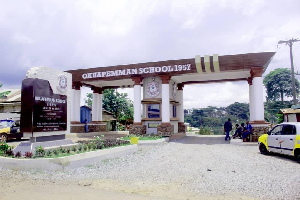Regional News of Friday, 3 October 2014
Source: GNA
Landowners cautioned against sale of lands to foreigners
The outright sale of lands to foreigners in Ghana is unlawful, Mr Gershon Quarmie Tsra, Volta Regional Head of the Lands Commission has said, quoting relevant portions of Article 266 of the 1992 Constitution of Ghana, to buttress his point.
Clause One of Article 266 titled “Ownership of Land by non-citizens,” states, “No interest in, or right over, any land in Ghana shall be created which vests in a person who is not a citizen of Ghana a freehold interest in any land in Ghana.”
Clause Two of that same Article states that, “An agreement, deed or conveyance of whatever nature, which seeks contrary to clause (1) of this article, to confer on a person who is not a citizen of Ghana any freehold interest in, or right over, any land is void.”
Referring to Clause Five of Article 266, Mr Tsra said, foreigners are only entitled to leasehold not exceeding 50 years.
“The truth hurts, but we will tell you the truth, we are aiding foreigners to take over our lands, most of the time we front for them, let us be serious,’ Mr Tsra admonished.
He said, while no Ghanaian could have freehold title to land in neighbouring countries, their citizens are having a field day in Ghana.
Mr Tsra said soon after independence the then government acted to convert all freeholds in the prime areas” in Accra by foreigners into leaseholds, describing land as a “heritage” which should not be ceded to non-citizens perpetually.
He was addressing a monitoring and evaluation interface meeting on the Land Administration Project (LAP) in Ho under the auspices of the Civil Society Coalition on Land (CICOL) Ghana, and its partners.
It was attended by landowners, chiefs, family and clan heads, and heads of land agencies from the region.
Mr Tsra described land as “gold,” which landowners in the region could use as equity in future investments, to the benefit of current and future generations, instead of selling them.
Mr Tsra, therefore, advised landowners in the region to collaborate with the Lands Commission to implement the reforms envisaged under the LAP.
He said it should take at most three weeks for landowners to have their lands registered in the region, following the implementation of LAP, as opposed to three months prior to that project.
Mr Tsra said if land documents were properly prepared by professionals it could take one day for land owners to get their lands registered in the region.
Mr Tsra, therefore, admonished prospective land buyers to engage professionally qualified surveyors and related professionals, to prepare their land documents for them, cautioning that “when you buy land you buy litigation.”
Mr Tsra explained the objectives, prospects, progress and challenges associated with the implementation of LAP which began in 2003.
Speaking on the role of Survey in Land Administration in the Volta Region, Mr Jojoe Adu-Hanson Head of the Survey and Mapping Division of the Lands Commission, advised those engaged in land transactions in the region, to engage qualified and professional surveyors.
He said draughtsmen were not trained to do surveying, because “survey is a complete scientific activity full of mathematics,” which must be done within prescribed laws and must be accurate.
Mr Adu said the situation in the region is however chaotic because most of the surveying done by draughtsmen did not represent what was on the ground.
He said most of the time land boundaries as presented by draughtsmen, overlapped when verified against what was on the ground.
In some instances, land said to be located in Ho could be represented as located far away from Ho.
Mr Adu said genuine land owners stood the risk of losing their property if somebody else engaged professional surveyors to work on those same lands.
He said a major challenge was that there were very few professional surveyors in the system, and that a proposed Survey Council and Estate Agency Bill, when passed into Law, would help regulate the practice of surveying in the country.
Madam Lillian Bruce, Co-ordinator of CICOL, said the the major indicators on the implementation of LAP showed the implementation of the Project was slow.
“The delays are too much she lamented”.
She said this could affect the commencement of other phases of the project, with funding from the World Bank.










